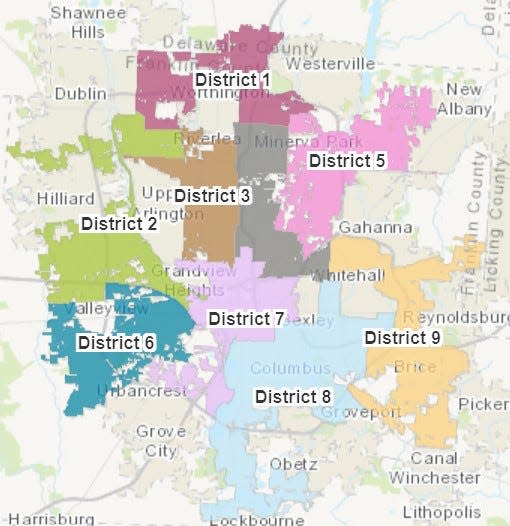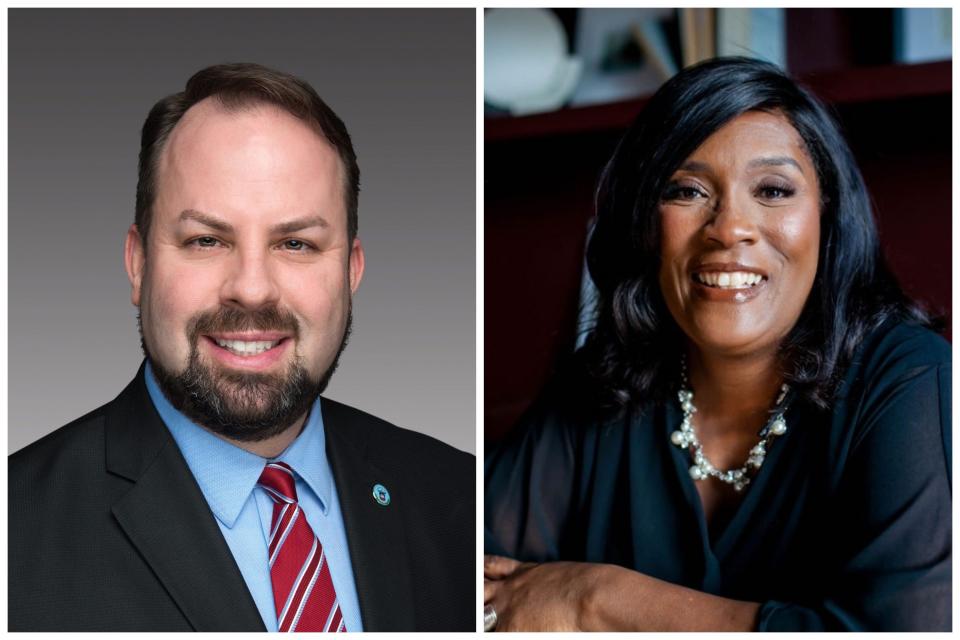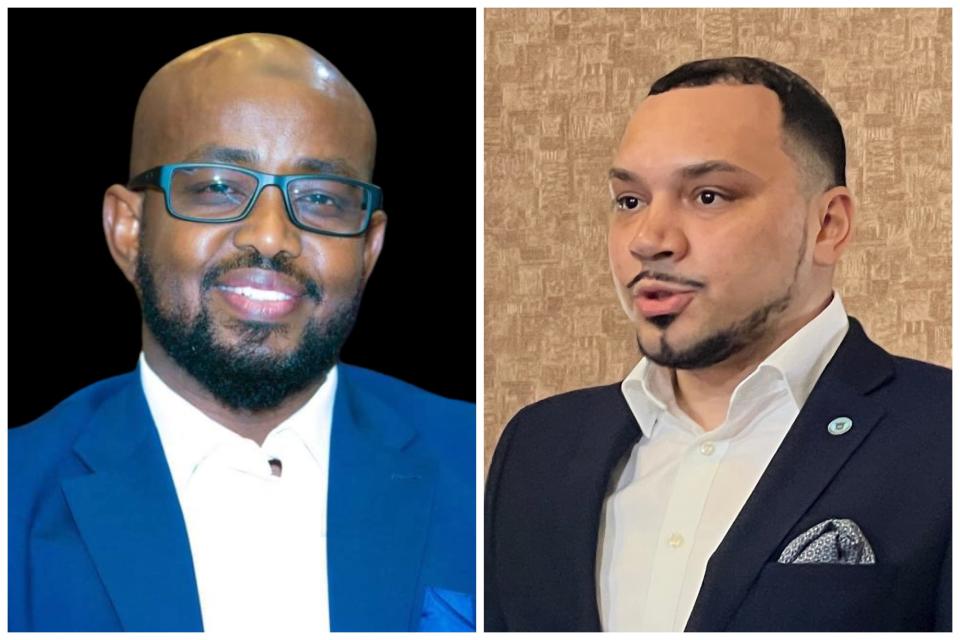Who's running for Columbus City Council under the new 9-seat residential districts system?
- Oops!Something went wrong.Please try again later.
- Oops!Something went wrong.Please try again later.

Theoretically, Columbus City Council was expected to undergo a major change in the Nov. 7 general election with an expansion from seven to nine seats and all seats up for grabs with one member elected from each of the nine new residential districts.
City charter changes approved by voters in 2018 to add two councilmembers and to elect one resident member from each district were designed to improve geographic diversity and neighborhood representation.
To be sure there will be some new faces, but instead of being elected only by voters in each of their districts, council members will be elected at-large by all voters in the city. To win, a person must be the top vote-getter citywide among residents of their district.
This hybrid system is used nowhere else in Ohio. Its creation followed a 2016 attempt by political activists to create 10 wards and three at-large Council seats, which failed overwhelmingly in a low-turnout summer election in which only 9% of registered city voters went to the polls.
Due to a similar lack of interest of people seeking some council posts, there will be no surprises for six of the nine council seats on the general election ballot. Four of the current six incumbents plus two newcomers are guaranteed seats on the new, expanded council because they are unopposed on the ballot and there are no cerified write-in candidates that could potentially upset the apple cart in any longshot bids.
"Yes, as long as they receive a vote, then they will be elected," said Aaron Sellers, a spokesperson for the Franklin County Board of Elections.
The unopposed incumbents include: Council President Shannon Hardin (District 9), 36, who works full time in his elected post and is a protégé of former four-term mayor and influential city lobbyist Michael B. Coleman; and Councilmembers Rob Dorans (District 3), 37, who is chief legal counsel at ACT Ohio; Shayla Favor (District 7), 42, who is a private attorney; and Lourdes Barroso De Padilla (District 8), 47, who is a vice president with City Year Columbus, which works with Columbus City Schools students.
The unopposed newcomers are Chris Wyche (District 1), 38, who is an external affairs manager with AT&T Ohio, and Melissa Green (District 6), 34, who is a social worker. Both are making their first runs for office.
That leaves only a third of the City Council seats — Districts 2, 4 and 5 — with competitive races on the November general election ballot.
In two of the new residential districts, Districts 4 and 5, incumbents Emmanuel Remy and Nick Bankston are fighting to retain their seats against political newcomers Adrienne Y. Hood and Farxaan Jeyte, respectively. The third contested race, in District 2, involves two newcomers: Nancy Day-Achauer and Luis Gil.
Only two council candidates, Gil and Jeyte, are running as endorsed Republicans. In Columbus and much of Franklin County, Democrats increasingly hold a monopoly on almost all elected government and judicial seats. Having the endorsement of the county Democratic Party has become very important, as it gets a candidate's name on the party's "sample ballot," which gets distributed by volunteers outside the county Board of Elections and voting stations across the city.
Being on the Democratic sample ballot has been proven a game-changer in local contests, with even relatively unknown candidates who have faced off against better established incumbents have ridden that golden ticket to victory.
Here is a rundown of the candidates for City Council in contested ballot races. The following details on where the contested candidates stand on issues was gleaned from answers they provided to a questionnaire they completed for The Dispatch, interviews and publicly available information.
District 2: Luis Gil vs. Nancy Day-Archauer

Luis Gil, 62, is a professional Spanish translator in court trials. He moved to the United States from Venezuela when he was 18 years old. Before he left that country, he told a guy he met in a elevator he was leaving for the U.S. He said the man responded: "Go to Ohio." So he did — arriving with two suitcases, he said.
"So I want to bring to the city the same thing that this city, and this state and this country has given to me," he said at a recent candidate event. "I just want to give back."
Gil, a Republican, has twice run unsuccessfully for Franklin County commissioner, in 2020 and 2022.
Gil's biggest concern for Columbus is the "alarming rise in crime rates, which threatens the safety and well-being of our community." To address this, he would bring "a conservative perspective (that) would prioritize and enforce law and order, advocating for more support for our police force, understanding of their mission and what they need to effectively combat crime.
"Prioritizing mental health services and responsible gun ownership education can enhance neighborhood safety," Gil said. "Equally crucial is building trust between the community and law enforcement for lasting change. Merely funneling funds into summer gun violence prevention isn't the answer."
Gil also supports Ginther's zoning overhaul, which Hardin has said will be presented early next year. The changes "can foster more sustainable development, encourage affordable housing, and promote efficient land use," he said.
Nancy Day-Achauer, 62, is a United Methodist Church minister at two chruches in the city's Hilltop area. She previously served on the Westland Area Commission and ran as a Democrat for Ohio House in 2020, losing to Republican Laura Lanese. She is endorsed by the Franklin County Democratic Party.
"I'm running on a record of actual service," Day-Achauer said at a recent candidate forum, a reference to many of the social programs she runs through her churches. She said her motto is: "I get stuff done." Except she usually doesn't use the word "stuff," she added.
Day-Achauer said the greatest issues facing Columbus are crime/public safety and a shortage of housing that is increasing costs and property taxes. She supports Mayor Andrew Ginther's bid to dramatically overhaul the city's zoning laws, streamlining the path for developers.
"The Columbus of today has different needs than the Columbus of 1953 and zoning should reflect those differences," Day-Achauer wrote in response to a Dispatch candidate questionnaire. "The need for variances and rezonings has made it arduous and costly for individuals to make changes to their property, and for builders to meet our housing and commercial needs."
The city's attempts at gun controls are moves in the right direction for controlling gun crime, but are being thwarted at the GOP-controlled state government, she said.

District 4: Emmanuel Remy vs. Adrienne Hood
Emmanuel Remy, 51, is a real estate agent and has served five years as a city councilmember, where his responsibilities include chairing the Public Safety Committee, overseeing the police and fire divisions. Before that he served on the Northland Community Council, including as its president. He is endorsed by the Franklin County Democratic Party.
"I know the number one issue on our residents’ minds is public safety," Remy responded to the Dispatch candidate questionnaire. "We are investing in training, expanding alternative crisis programming, and building crime prevention and intervention initiatives," such as summer youth grants over the last three years.
"As (public safety) committee chair, my policy focus is to be smart on crime and make sure we are getting the right response for every call for service, every single time."
In a public appearance at a candidate forum in early October, Remy told a crowd of about 50 on the South Side that "we need to work harder, all together, stack hands, working to make sure that our youth are taken care of and that we're making a difference as to what happens on our streets."
To combat gun crime, the city should expand wraparound services like after-school programs, sports programs, job training workshops, and pool access. "Council’s “Lock Your Guns, Save Our Children” campaign to promote gun safety and give away free gun cable locks also helps by providing resources to our residents."
Remy supports Ginther's drive to overhaul zoning for "quicker development of housing, therefore a more affordable housing market."
Adrienne Hood, 51, became a community activist when her 23-year-old son, Henry Green, was fatally shot eight times by Columbus police during an exchange of gunfire in June 2016. She is a customer account specialist at the Defense Logistics Agency in Whitehall, having retired from more than two decades as a member of the Army and Air Force reserves. She is a member of the Franklin County Democratic Party Central Committee.
"The death of my son brought me into this space," Hood said at a candidate forum on the South Side. "It is those experiences who make us who we are.
"In my pursuit of accountability for him (Green), I learned so much about the policies, what we have, what we didn't have," like independent investigations and mandatory drug testing of police who use deadly force, Hood said in an interview.
"The greatest issue facing Columbus, I believe, differs based on who you ask," Hood said in her Dispatch questionnaire response. "However, if I had to sum it up into one word it would be public safety," which at the core includes communities "being priced out of their homes and not being paid enough for the labor they do."
"There have been many conversations around equity, however what it takes for one community to be whole may take more than another community, and we have to be willing to address those issues wholeheartedly."
Hood agrees that zoning may be contributing to the housing shortage, but she doubts that would fix the housing shortage entirely, she said. And in dealing with the city's gun violence, Hood wants to drill down deeper into societal problems. The city got where it is through a "lot of disinvestment" in many neighborhoods, she said. "I was born and raised here, and I watched it happen."

District 5: Farxaan Jeyte vs. Nick Bankston
Farxaan Jeyte, 44, came to the United States as a teenage refugee from the civil war in Somalia in the early 1990s. He graduated from Linden-McKinley High School and Ohio Dominican University with a bachelor of arts in communication. He is president of Dalmar TV, according to his LinkedIn page, and reported to The Dispatch that he is a local entrepreneur with several small business that include convenience stores, a day care and a restaurant.
Jeyte said he had a nephew who was killed by Columbus police. He supports spending more money on better police training and hiring more officers, Jeyte said, but "those officers have to come from the community they patrol."
Jeyte believes the biggest problem facing Columbus is the lack of affordable housing, contributing to homelessness by "making it difficult for many residents to find affordable and stable living arrangements," he wrote in his Dispatch questionnaire. He supports new housing initiatives, strengthening tenant protections, and fostering partnerships between government, nonprofit organizations, and the private sector.
Jeyte also thinks the city's zoning laws are due for an overhaul "to address issues such as outdated regulations, lack of flexibility, and limited housing options."
Jeyte said he supports local, multi-faceted gun-control measures that include strengthening background checks, enforcing existing laws, and promoting responsible gun ownership.
The city faces many issues, and "our leaders have to take responsibility and look themselves in the mirror," Jeyte said. "...We have to hear from the people, not just developers."
Nick Bankston, 34, is a former city Department of Neighbors administrator for Mayor Andrew J. Ginther who ran and won a seat on council as part of a well-financed Council ticket with Hardin and Barroso De Padilla in November 2021. In January 2021, he left his city post and became CEO of Gladden Community House, a social services organization in Franklinton.
In August, he became a director with Alvis, a nonprofit reentry program for at-risk clients. He is endorsed by the Franklin County Democratic Party, where he serves as a Central Committee member, and has served on the Franklinton Area Commission.
"I want to be very clear: this is the most progressive council of my lifetime of living in this city," Bankston told citizens gathered at the South Side candidate forum, referencing his fellow incumbents. "And we're going to continue to press on issues of housing, making sure our neighborhoods are safe, making sure we continue to get good-paying jobs — because that's how we're going to have a city that everyone loves."
In a Dispatch questionnaire answer, Bankston said that "the growth that we are seeing as a city and region is exacerbating many issues that I’m running to address: safety, housing, education, and transportation."
Bankston, who chairs the council's Economic Development Committee that advances developer tax abatements, said on his questionnaire that the city "must address the root causes of crime, continue to invest in affordable housing and after school/summer programs, and we must fund high-capacity transit."
The city's zoning code is not adequate to handle that growth, and by overhauling it "we will tackle our affordable housing crisis and build a more equitable city," Bankston said.
On gun crime, Bankston said the city is doing everything it can, but its "hands are tied" by Republican state lawmakers who "refuse to enact common sense gun laws."
Candidates' thoughts on city pools
Each of the six candidates in contested residential districts also responded to a Dispatch question about the adequacy of the number of public swimming pools in Columbus with statements that, in general, indicate the city operates too few pools for its size and should examine investing money into the construction of more.
The city's distribution of pools is "not sufficient" and not well enough "spread throughout the city," creating a "disparity" and "barriers of access" for some neighborhoods with no nearby city facilities, the candidates said in their comments.
How council terms will work with all 9 seats on ballot
After being seated in January, the nine council members will "draw lots," or straws essentially, to see if they won two-year or four-year terms so that the council will eventually have staggered four-year terms that overlap by two years. Five members will get four-year terms, and four members initially will get two-year terms before their seats go to full four-year terms starting in the 2025 election.
The proposal to elect City Council members by district was born out of recommendations from a charter review committee that Mayor Andrew J. Ginther and Council President Shannon Hardin appointed in August 2016 to review the size and structure of the body, which has been elected at-large rather than by wards since 1916.
wbush@gannett.com
@ReporterBush
This article originally appeared on The Columbus Dispatch: Only three of nine seats on Columbus City Council contested on ballot

